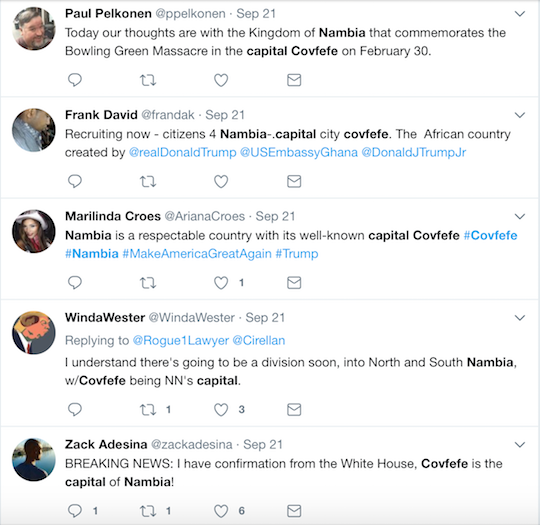When President Trump praised the non-existent country of Nambia at the UN in September, Bill Maher joked that the capital of Nambia was Covfefe. So did a seemingly endless number of Twitter users, not just over time but on the very same day. There is something about Donald Trump that encourages everyone to come up with the same jokes. There is also something about him that makes us feel the pressing need for political comedy. When a self-aggrandizing billionaire with an unusual physical appearance becomes president, satire should shine. Yet political comedy in the first year of the Trump administration has been strangely lackluster. Why isn’t the most comical president in history1 generating better comedy?
The New York Times Magazine let me consider this problem in a profile of Anthony Atamanuik, who plays Trump on The President Show on Comedy Central. Gigantic, sun-blotting props to Willy for helping to develop a unified theory of Trump comedy, which starts like this:
A funny Trump impression presents two broad challenges. The first is that the president exists in a cloud of signifiers: his infomercial hand gestures, his practiced facial expressions, his broad accent and narrow diction and relentless catchphrases, to say nothing of his hair and skin. Any impression of him must include these signifiers, but they are so numerous and recognizable as to weigh it down, limiting the space for the impressionist to contribute his own insights. The adage “It’s funny because it’s true” is a phenomenological account. It describes a change in the audience: It’s funny because (I just realized) it’s true. We laugh when we are surprised to recognize something. The problem with Trump is that everything about him is recognizable immediately. There seem to be no subtle truths under the cacophony of overt signifiers, so that every joke about him becomes merely a reference.
That’s the Covfefe Problem: It’s hard to think of an original joke about Trump, but it’s easy to think of a recognizable reference. The other horn in this comedy dilemma is the Clapter Problem. What is clapter? You’re just going to have to read the profile and find out, or buy Mike Sacks’s book Poking a Dead Frog, which is where I first encountered the term. But while you’re waiting for the book to arrive,2 read the Times piece. Remember how Combat! blog was on hiatus for weeks and everyone stopped reading it? This was one of the four big projects that forced me to put the blog aside. Now all of them are done, and I am rich. We’ll be back tomorrow with more self-promotion.





Thank goodness, the withdrawal symptoms were brutal. I had to interact with actual people and read other sources of information.